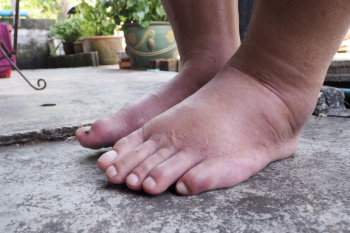
Heart failure presents a complex web of symptoms, one of the most visible being swollen feet. This swelling, known as edema, stems from the heart's inability to effectively circulate blood throughout the body. As the heart weakens, blood flow slows, causing fluid to accumulate in the lower extremities due to gravity's pull. This edema is not just uncomfortable, it serves as a crucial indicator of worsening heart failure. Recognizing this connection is vital for timely intervention and management. Here, the role of a podiatrist, a specialized foot care professional, becomes paramount. Podiatrists can assess the severity of swelling, provide guidance on managing edema, and offer treatments to alleviate discomfort. They work in tandem with cardiologists and other healthcare providers to address the broader implications of swollen feet in heart patients. If you have swollen feet, it is suggested that you schedule an appointment with a podiatrist who can provide you with a diagnosis and treatment options.
Swollen feet can be a sign of an underlying condition. If you have any concerns, contact Howard Abramsohn, DPM of Ambulatory Foot and Ankle Associates, LLC. Our doctor can provide the care you need to keep you pain-free and on your feet.
Swollen feet are a common ailment among pregnant women and people who stand or sit for extended periods. Aging may increase the possibility of swollen feet and patients who are obese often notice when their feet are swelling too. There may be medical reasons why swollen feet occur:
- Phlebitis - A condition that causes the veins to become inflamed and can also cause leg pain.
- Liver disease - This may lead to low blood levels of albumin which is a protein. This can cause fluid in the blood to pass into the tissues and several areas of the body can become swollen.
- Heart failure - When the heart doesn’t pump properly the blood that is normally pumped back to the heart can pool in the veins of the legs causing swollen feet.
- Kidney disease - One of the main functions of the kidneys is releasing excess fluid in the body. This type of condition can make it difficult for the kidneys to function properly, and as a result the feet may become swollen.
- Deep-vein thrombosis (DVT)- This is a serious condition where blood clots form in the veins of the legs. They can block the return of blood from the legs to the heart which may cause the feet to swell. It is important to be treated by a podiatrist if this condition is present.
Swollen feet can also be caused by bone and tendon conditions, including fractures, arthritis, and tendinitis. Additionally, there may be skin and toenail conditions and an infection may cause the feet to swell. Patients who take medicine to treat high blood pressure may be prone to getting swollen feet.
Many patients elevate their feet to help relieve the swelling and this is generally a temporary remedy. When a podiatrist is consulted the reason behind the swelling can be uncovered and subsequently treated.
If you have any questions please feel free to contact our office located in Mt Laurel Township, NJ . We offer the newest diagnostic tools and technology to treat your foot and ankle needs.
